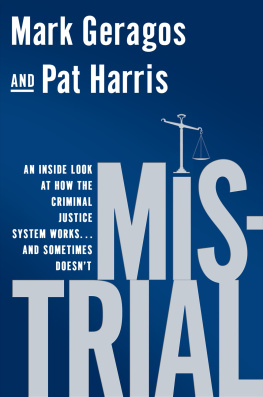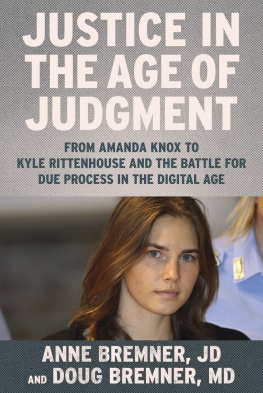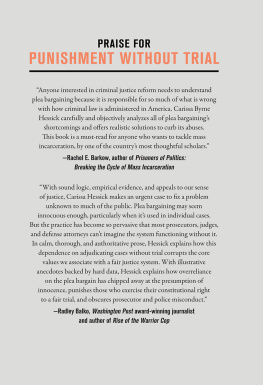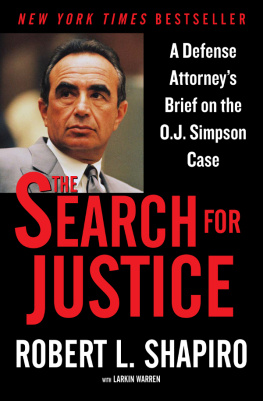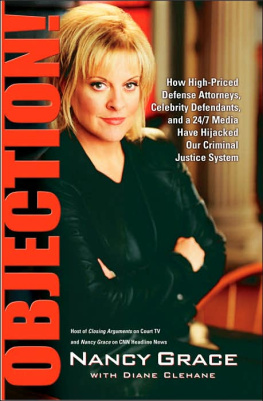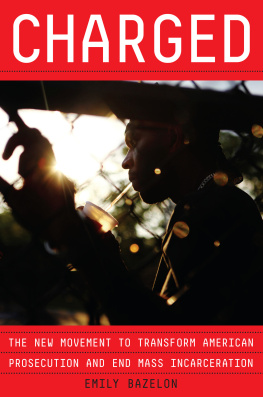MISTRIAL
AN INSIDE LOOK AT HOW THE CRIMINAL JUSTICE SYSTEM WORKS... AND SOMETIMES DOESNT
Mark Geragos and Pat Harris
GOTHAM BOOKS
Published by the Penguin Group
Penguin Group (USA) Inc., 375 Hudson Street,
New York, New York 10014, USA
USA | Canada | UK | Ireland | Australia | New Zealand | India | South Africa | China
Penguin Books Ltd, Registered Offices: 80 Strand, London WC2R 0RL, England
For more information about the Penguin Group visit penguin.com.
Copyright 2013 by Mark Geragos and Patrick Harris
All rights reserved. No part of this book may be reproduced, scanned, or distributed in any printed or electronic form without permission. Please do not participate in or encourage piracy of copyrighted materials in violation of the authors rights. Purchase only authorized editions.
Gotham Books and the skyscraper logo are trademarks of Penguin Group (USA) Inc.
LIBRARY OF CONGRESS CATALOGING-IN-PUBLICATION DATA
has been applied for.
ISBN 978-1-101-59501-5
While the authors have made every effort to provide accurate telephone numbers, Internet addresses, and other contact information at the time of publication, neither the publisher nor the authors assume any responsibility for errors or for changes that occur after publication. Further, the publisher does not have any control over and does not assume any responsibility for author or third-party websites or their content.
Some names and identifying characteristics have been changed to protect the privacy of the individuals involved.
Version_2
This book is dedicated to my father, Eugene Harris, a man who has lived life with integrity, a strong sense of devotion to others, and an unwavering dedication to his family. He is as good and decent a man as I have ever known and has set a standard for character that I will never live up to but which I strive for every day.
Pat
I would like to dedicate the book to my father, Paul (Pops) Geragos. Pops taught me long ago that the single most honorable thing a man can do is to fight for those who have no one to fight for them. He has spent every day as an attorney living up to that belief. He has also made sure that I never forget the genocide of our ancestors, the Armenian people, at the hands of the Turks, and that I should continue his life work to make sure that the Armenian people always have someone to fight for them.
Mark
CONTENTS
Politics, O. J. Simpson, and the Rise of the Angry Blond White Women
Defense AttorneysWe Sleep Very Well at Night, Thank You Very Much
ClientsThirty-Nine Floors Is a Long Way to Fall
ProsecutorsBeing a Prosecutor Means Never Having to Say Youre Sorry
JudgesAt Least Get It Wrong for Both Sides
Police Officersto Preserve, Protect, and to Lie
JurorsNobody Knows Anything
MediaShame on You for Believing What We Say
The Best System in the World???
Introduction: Mark
From the time I was five, it was as if I was programmed to be a lawyer. For the first thirteen years of my life my father was a prosecutor for the Los Angeles County District Attorneys Office. I have fond memories of going to court and watching him and thinking to myself what a great job he had. You get to go talk with people, tell stories, go out to eat, and occasionally argue with people in court. And people pay you to do this. It seemed like a pretty sweet deal.
By the time I got to college, though, all that had changed. When I was a senior at Haverford College, I actually had thoughts about going in a wholly different direction. During college I majored in Sociology and Anthropology with a concentration of classes in the Philosophy of Religion. One of the professors whom I idolized was named to head the Divinity School at Harvard, and I gave serious thought to following him there after graduation. I even considered becoming a priest, which I suppose was a throwback to my days as an altar boy at St. Gregory Armenian Church of Pasadena. When I tell people that today, I usually have to pause for them to stop laughing, but at the time it was no joke. My sainted mother assumed I would follow in my fathers footsteps and become an attorney, but I seriously considered going to divinity school. I spent the better part of my senior year in college agonizing over the decision.
Finally I went to Archbishop Vatche, who at the time was the head of the Western Diocese of the Armenian Apostolic Church, and told him my dilemma. I had known him since I was twelve years old and attended Armenian summer camp, and I respected him immensely. I fully expected him to encourage me to pursue divinity school and the priesthood, but as I explained my passion for my religious studies, he just kept shaking his head. After patiently listening to me pour my heart out, he finally responded in the tell-it-like-it-is fashion he was known for:
Mark, I have seen you at church camp since you were twelve years old. We have spent the last five years disciplining you for drinking, smoking pot, and chasing the girls that have come to camp. I cant afford to spend the next forty years trying to slow you down. Go be a lawyer and help represent the Church when we need you one day.
So with what I guess was Gods blessing, I started law school. Sure enough, in law school I found a second callingit just wasnt to be a lawyer. In an effort to make a little extra money, I began moonlighting by booking bands at a local venue in Pasadena. It was the era of the B-52s, X, Oingo Boingo, Missing Persons, the Ramones, and the Plasmatics, bands that drew huge crowds partly due to their music and partly due to their penchant for blowing up things on stage. A young rock promoter could do very well for himself as long as he could afford the insurance. My last year in law school I was spending much more time promoting concerts than worrying about the arcane details of writing a will or setting up a trust.
Graduation from law school was not a foregone conclusion, but I managed to convince the registrar that my real-life experiences writing contracts and dealing with police raids were every bit as valuable as time spent in the classroom. In reality, the law degree was gravy. I was busy setting up a business empire in the music industry.
It didnt take long for me to find the perfect opportunity. Having developed a relationship with one of the local radio stations, I was approached by a group that was attempting to buy a small but potentially powerful rock station in Los Angeles. The station was new, but I believed it had incredible potential. Even more incredible was that I could own a large share of the station for approximately $200,000. A quick check of my bank account showed that all I needed to come up with was $198,500. Thankfully, the bank was inclined to give me a credit line for the purchase if my father would cosign for the loan.
My father, Paul Geragos, or Pops as he is more widely known, had been a legend in the L.A. County District Attorneys Office for more than a decade before leaving to set up a practice as a criminal defense attorney. He had been an immediate success in private practice largely due to his reputation as a take-no-prisoners courtroom attorney, and he was now reaping the financial rewards. I went to Pops and pleaded with him to loan me the money or at least cosign a loan with me. He turned me down flat. And of course, being a lawyer, he didnt simply say no. Pops used the opportunity to lecture me on the instability of the music industry and how I needed to get a job at the D.A.s office, work for a few years, and then join his law practice.

